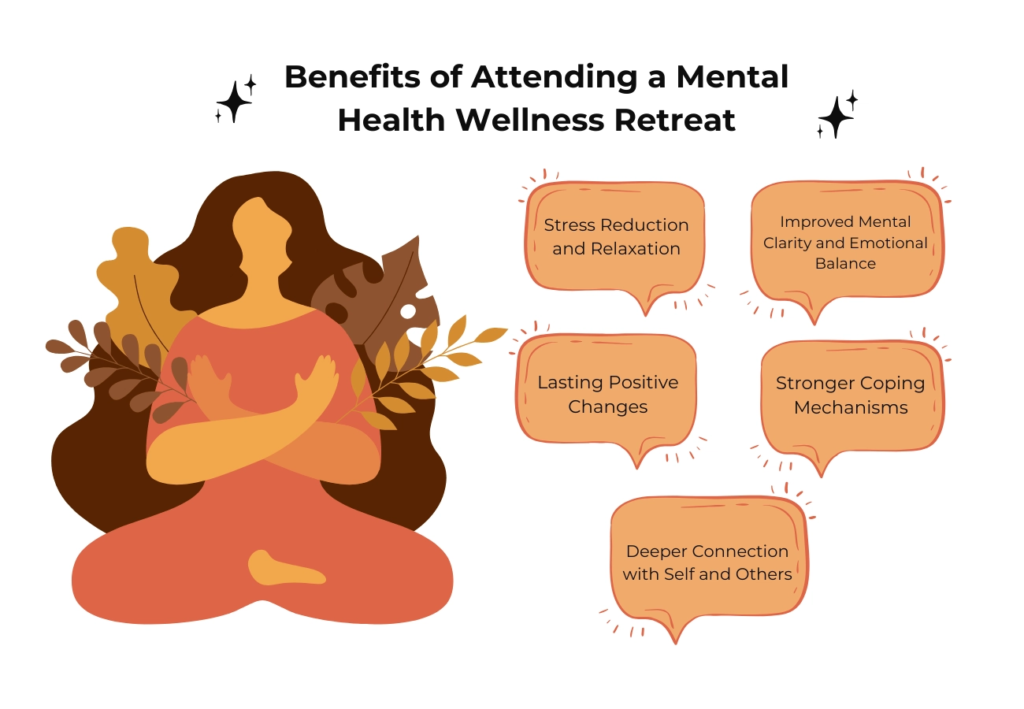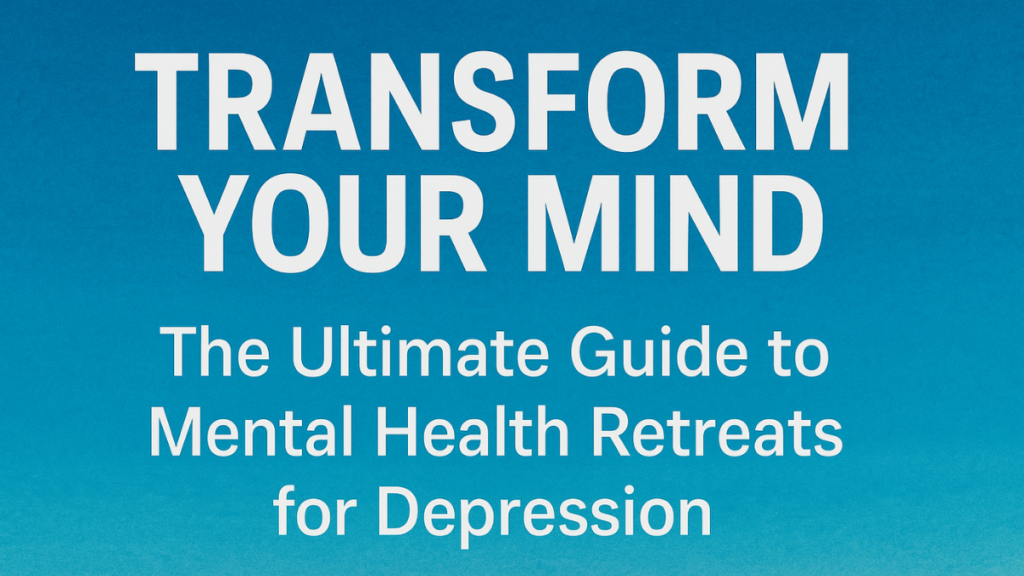Discover how mental health retreats for depression can help you transform your mind and life. Learn about the benefits, types, challenges, and FAQs in this detailed guide.
also read: https://babessproduct.com/how-family-doctors-use-your-familys-health-history-in-your-care/
Introduction
Mental health is just as important as physical well-being, yet it’s often overlooked. For individuals struggling with depression, a break from routine life may be the key to healing and self-discovery. This is where mental health retreats come in. They offer structured environments focused on emotional healing, therapeutic support, and holistic wellness.
If you’re searching for a way to break free from the cycle of depression, Transform Your Mind: The Ultimate Guide to Mental Health Retreats for Depression will provide you with everything you need to know. This comprehensive guide covers what mental health retreats are, how they work, their benefits, challenges, and what to expect during your stay.
What Is a Mental Health Retreat?
A mental health retreat is a specialized program or facility that offers intensive support for individuals facing mental health issues such as depression, anxiety, PTSD, or burnout. These retreats combine traditional psychotherapy, alternative healing techniques, and holistic approaches in a peaceful environment, usually away from the stressors of everyday life.

Unlike outpatient therapy or inpatient psychiatric hospitals, mental health retreats provide a nurturing, non-clinical setting where you can work on your emotional and psychological well-being without judgment or pressure.
Why Choose a Mental Health Retreat for Depression?
When struggling with depression, it’s often hard to make progress in a regular environment filled with responsibilities and triggers. Mental health retreats offer a unique solution. They are built to:
- Provide a safe and serene space for healing.
- Offer professional guidance with personalized therapeutic programs.
- Encourage emotional breakthroughs in a supportive group setting.
- Help you adopt long-term coping strategies and healthy lifestyle changes.
By choosing the right retreat, you are taking a powerful step toward reclaiming your mental health and reshaping your mindset.
Key Benefits of Mental Health Retreats

1. Personalized Treatment Plans
Retreats tailor their services to fit your specific needs. Whether you require cognitive-behavioral therapy (CBT), trauma therapy, or holistic treatments like yoga and meditation, you receive a plan that focuses on your individual mental health journey.
2. Detox from Stressful Environments
Removing yourself from your usual environment—where stress, pressure, and toxic patterns persist—can bring instant relief. A retreat provides space to breathe, reflect, and begin healing without distractions.
3. Holistic Healing Approaches
Most retreats focus on treating the whole person—mind, body, and spirit. Activities like breathwork, mindfulness practices, creative expression, and nature immersion are combined with professional therapy to offer a well-rounded approach.
4. Supportive Community
Depression often makes people feel isolated. Retreats foster a sense of belonging and connection with others who are also on a healing journey. Group therapy and communal activities allow you to learn, share, and grow together.
5. Lasting Tools for Recovery
Through counseling, coaching, and workshops, you’ll leave the retreat equipped with real tools for managing depression. These include stress management techniques, communication skills, and healthy routines that you can integrate into your daily life.
Types of Mental Health Retreats for Depression
There are various types of retreats, and choosing the right one depends on your needs and preferences.
| Type of Retreat | Description |
|---|---|
| Therapeutic Retreats | Focused on psychotherapy with licensed counselors and psychologists. |
| Spiritual Retreats | Often based in nature, these retreats use meditation, yoga, and introspection. |
| Luxury Retreats | Offer 5-star amenities alongside therapy, ideal for those seeking extra comfort. |
| Nature-Based Retreats | Held in tranquil settings like forests, mountains, or beaches to promote calm. |
| Group Healing Retreats | Combine therapy with group dynamics, perfect for building support systems. |
What to Expect at a Depression Retreat
When you arrive at a mental health retreat, you’ll undergo an initial assessment where professionals understand your background, triggers, and mental health goals. Based on this, a custom treatment plan is designed.
Typical Daily Schedule
Here’s a glimpse into what a day at a retreat might look like:
| Time | Activity |
|---|---|
| 7:00 AM | Morning meditation or yoga |
| 8:30 AM | Nutritious breakfast |
| 10:00 AM | Individual therapy session |
| 12:00 PM | Lunch |
| 1:00 PM | Group therapy or workshop |
| 3:00 PM | Nature walk or mindfulness session |
| 5:00 PM | Personal reflection/journaling |
| 7:00 PM | Dinner & relaxation |
Activities vary depending on the retreat center, but most aim to build emotional resilience and mindfulness.
Potential Challenges and How to Overcome Them
While mental health retreats can be transformative, there are challenges to consider:
Emotional Intensity
Working through emotional pain in a focused environment can be intense. You may feel overwhelmed initially, but this is part of the healing process. Skilled professionals are present to guide you through.
Financial Cost
High-quality retreats can be expensive, especially luxury ones. However, there are mid-range and even some nonprofit retreats available. Insurance may cover part of the cost if medical treatment is included.
Fear of the Unknown
Leaving home and committing to inner work can be scary. Doing research, reading reviews, and even speaking with past participants can help ease your fears.
How to Choose the Right Mental Health Retreat
Consider the following when selecting a retreat:

- Accreditation & Staff Credentials – Ensure therapists and facilitators are licensed professionals.
- Program Focus – Check if the retreat specializes in depression or other relevant mental health issues.
- Length of Stay – Retreats range from a few days to several weeks. Choose what fits your schedule and needs.
- Location & Amenities – Pick an environment that feels safe and appealing to you.
- Reviews & Testimonials – Feedback from past attendees can provide valuable insights.
FAQs About Mental Health Retreats for Depression
- Are mental health retreats effective for all types of depression?
Retreats are generally most effective for mild to moderate depression but can be part of a broader treatment plan for more severe cases. - Can I go to a mental health retreat without a therapist’s referral?
Yes, most retreats allow self-referrals, though medical history is usually assessed. - What should I pack for a mental health retreat?
Comfortable clothing, personal journal, essential toiletries, and any prescribed medication. - Will I have access to technology during the retreat?
Many retreats encourage digital detox, but policies vary—some allow limited access. - Are retreats covered by insurance?
Some therapeutic retreats are partially covered by health insurance if licensed providers are involved. - Can I leave the retreat early if it’s not working for me?
Yes, participation is voluntary, though it’s encouraged to complete the program for best results. - Are there retreats for specific age groups?
Yes, some are tailored for young adults, seniors, or even teens. - Do retreats provide aftercare or follow-up support?
Many offer post-retreat coaching, online therapy, or alumni groups for continued support. - Are meals and accommodations included in the cost?
Typically, yes. Most retreats are all-inclusive unless stated otherwise. - What’s the difference between a retreat and inpatient psychiatric treatment?
Retreats are usually non-clinical, wellness-focused environments, while inpatient treatment is for acute psychiatric care.
Conclusion
Transform Your Mind: The Ultimate Guide to Mental Health Retreats for Depression reveals that healing doesn’t always come from medication or traditional therapy alone. Sometimes, stepping away from everyday chaos and immersing yourself in a peaceful, structured retreat can make all the difference.
Mental health retreats offer a path to rediscover yourself, learn powerful coping strategies, and find a renewed sense of purpose. Whether you’re battling burnout, grief, or long-term depression, the right retreat can help you reclaim your life.
If you’re ready to invest in your well-being and truly transform your mind, a mental health retreat might be the life-changing experience you need.
also read: https://babessproduct.com/how-to-address-vision-loss/
also read: https://babessproduct.com/what-to-know-about-pap-smears/

